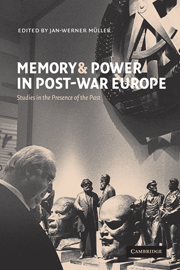Crossref Citations
This Book has been
cited by the following publications. This list is generated based on data provided by Crossref.
Eyerman, Ron
2004.
The Past in the Present.
Acta Sociologica,
Vol. 47,
Issue. 2,
p.
159.
Ben-Yehuda, Nachman
2005.
Terror, Media, and Moral Boundaries.
International Journal of Comparative Sociology,
Vol. 46,
Issue. 1-2,
p.
33.
Aaslestad, Katherine
2005.
Remembering and Forgetting: The Local and the Nation in Hamburg's Commemorations of the Wars of Liberation.
Central European History,
Vol. 38,
Issue. 3,
p.
384.
Evans, Martin
2006.
Memories, Monuments, Histories: The Re-thinking of the Second World War since 1989.
National Identities,
Vol. 8,
Issue. 4,
p.
317.
Jo, Sam-Sang
2006.
Memory and Interest in European Integration: The 1992 Ratification Crisis Resolution.
Journal of Contemporary European Studies,
Vol. 14,
Issue. 1,
p.
89.
Scates, Bruce
2007.
The first casualty of war: A reply to McKenna's and Ward's ‘Gallipoli pilgrimage and sentimental nationalism’.
Australian Historical Studies,
Vol. 38,
Issue. 130,
p.
312.
Wüstenberg, Jenny
and
Art, David
2008.
Using the Past in the Nazi Successor States from 1945 to the Present.
The ANNALS of the American Academy of Political and Social Science,
Vol. 617,
Issue. 1,
p.
72.
Tamm, Marek
2008.
History as Cultural Memory: Mnemohistory and the Construction of the Estonian Nation.
Journal of Baltic Studies,
Vol. 39,
Issue. 4,
p.
499.
Berger, Stefan
and
Holtom, Paul
2008.
Locating Kaliningrad And KÖNigsberg In Russian And German Collective Identity Discourses And Political Symbolism In The 750Th Anniversary Celebrations Of 2005.
Journal of Baltic Studies,
Vol. 39,
Issue. 1,
p.
15.
Heisler, Martin O.
2008.
Introduction: The Political Currency of the Past: History, Memory, and Identity.
The ANNALS of the American Academy of Political and Social Science,
Vol. 617,
Issue. 1,
p.
14.
Dessí, Roberta
2008.
Collective Memory, Cultural Transmission, and Investments.
American Economic Review,
Vol. 98,
Issue. 1,
p.
534.
Sidaway, James D
2009.
Shadows on the Path: Negotiating Geopolitics on an Urban Section of Britain's South West Coast Path.
Environment and Planning D: Society and Space,
Vol. 27,
Issue. 6,
p.
1091.
Whitling, Frederick
2009.
Memory, history and the classical tradition.
European Review of History: Revue europeenne d'histoire,
Vol. 16,
Issue. 2,
p.
235.
Randall, Nick
2009.
Time and British politics: Memory, the present and teleology in the politics of New Labour.
British Politics,
Vol. 4,
Issue. 2,
p.
188.
HANSEN‐MAGNUSSON, HANNES
and
WIENER, ANTJE
2010.
Studying Contemporary Constitutionalism: Memory, Myth and Horizon.
JCMS: Journal of Common Market Studies,
Vol. 48,
Issue. 1,
p.
21.
Tismaneanu, Vladimir
2011.
Dealing with communist past: The case of Romania.
Hungarian Studies,
Vol. 25,
Issue. 2,
p.
175.
Naef, Patrick
2011.
Reinventing Kotor and the Risan Bay, a study of tourism and heritage conservation in the New Republic of Montenegro.
European Countryside,
Vol. 3,
Issue. 1,
Burton, Tess
2011.
Painful memories: Chronic pain as a form of re-membering.
Memory Studies,
Vol. 4,
Issue. 1,
p.
23.
Closa, Carlos
2011.
Dealing with the Past: Memory and European Integration.
SSRN Electronic Journal,
Kończal, Kornelia
and
Wawrzyniak, Joanna
2011.
Polskie badania pamięcioznawcze: tradycje, koncepcje, (nie)ciągłości.
Kultura i Społeczeństwo,
Vol. 55,
Issue. 4,
p.
11.





